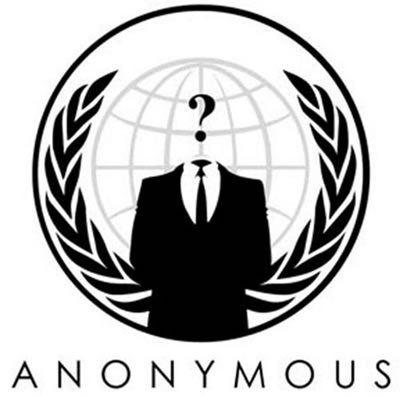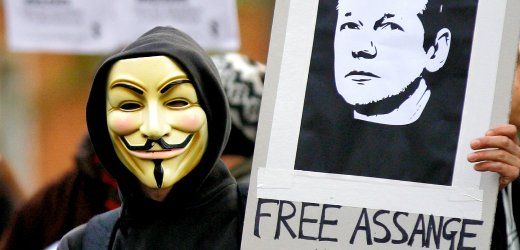Amidst the revolutionary turmoil of the Middle East, the shadowy online hacker group known as “Anonymous” has spread its influence. Government websites in Tunisia, Egypt, Yemen, Algeria, and Iran – as well as Zimbabwe and Italy — have been attacked and at times shutdown by the hacker group which claims it fights in its own way for freedom.
Leading the way in this new age of digital warfare, Anonymous has described its members as vigilante defenders of free speech and opponents of censorship. Their primary method of attack is distributed denial-of-service (DDoS), which rapidly overloads websites with simultaneous requests, freezing or crashing computer servers.
So who exactly are these hacktivists?
Ars Technica reported that Anonymous is a scattered and diverse group of individuals, ranging from students to office-workers, from software developers to IT support technicians.
The group claims to fight for freedom “as a swarm” and not as an organization or business, according to Topiary Gardenslayer, an online Anonymous activist identified as being heavily associated with the group. Spokesman for Anonymous, Gregg Housh, said that Gardenslayer frequented the Anonymous Operations computer servers (Anon Ops) that are used to plan attacks and seemed to understand the group’s objectives.
A member of the group told Al Jazeera English that the movement “grew out of message boards frequented mostly by young people with an interest in internet culture in general – and Japanese media in particular.”
In 2005, they began attacking online venues “as a sort of sport, and in the process honed their skills in a way that proved useful in information warfare,” the informant said.
The group helped Tunisian protestors, furious with the regime, by shutting down their government’s websites after the government had taken down the country’s internet . Al Jazeera reported that some Tunisians assisted in the online attacks and can be shown in a YouTube video thanking Anonymous.
After Egyptian President Hosni Mubarak restored internet to his country after a shutdown the government initiated to weaken the protest movement, Anonymous fired back with “Operation Egypt” shutting down the Egyptian government’s websites.
“The activism online reflects the activism that you see on the streets,” said Daniel Castro, a senior analyst at the Information Technology and Innovation Foundation. ”Taking down government websites has effectively shut down one means of communication for the government and helped amplify the voice of protesters.”
Gardenslayer said, “We wanted to let the protesters (especially in Tunisia and Egypt) know that we had their backs, and that we’d fight for them in any way we could.”
Scott Andes, Research Analyst at The Information Technology and Innovation Foundation, commented, “The Internet has emerged as the most freedom-promoting medium of communication in world history, if ‘just-in-time’ Internet shutdowns become a tool in the toolbox of authoritarian leaders then this is call for concern and will require action by the international community.”
Anonymous claims to believe that censorship, the stifling of free speech and the “unchecked greed of corporate powers and governments threaten our culture and our existence.” The group says it “share[s] that common fundamental interest with the public.”
Castro said that Anonymous is a varied group and that its supporters include “fringe elements from across the ideological spectrum. They are more the digital equivalent of an angry mob: fickle, unpredictable, and dangerous.”
“Not every target gets the full ‘wrath’ of Anonymous,” said Gardenslayer. Anonymous chose to DDoS PayPal, Visa, and MasterCard, overloading their websites, instead of hacking them which could have left their sites defaced or permanently damaged.
“We felt that, despite being cowardly in pulling away from WikiLeaks, they weren’t directly abusing their customers, and they didn’t deserve to be hacked,” Gardenslayer said. “We felt differently about the Tunisian government, however, and hacked/defaced their websites instead of DDoSing them.”
Various factors constitute an Anonymous operation. If the group believes a target has “done something particularly corrupt or oppressive, or that it has gone too far with censorship, attacks are planned,” said Gardenslayer.
“We do not get paid in any way,” Gardenslayer said, asserting that Anonymous simply appreciates making a difference for the causes the group believes in. “It’s just a shame the FBI doesn’t see our efforts in the same light. There are other things implied about US foreign policy when the government pursues Anonymous at the neglect of Tunisia’s plight because we’re interfering with their politics. Though, we’d hope for others to carry on that conversation.”
The group didn’t expect what they said has been a “globally positive reaction” from the Tunisian protestors, some of which held up Guy Fawkes masks to thank Anonymous for its involvement. The masks, used as a symbol of Anonymous, were popularized by the graphic novel and film “V for Vendetta” that dealt with a government takeover by its citizens.
Anonymous says that its actions support a freer world, “where governments don’t oppress their citizens and the internet is kept open for anyone that wishes to use it.” The group declares that it defends freedom of speech and information at all costs, saying, “There is no task too big for Anonymous, because we are everyone and we are no one.”
Up next for Anonymous is reportedly “Operation Iran,” which began earlier this month. In a short YouTube press release, Anonymous spoke to the Iranian people saying that the government “can’t kill your fighting spirit, they can’t kill your freedom. Know that we support you.”
One of their latest tweets suggests that the group has no intention of stopping what they are doing anytime soon: “Tunisia, Egypt, Bahrain, Libya, Yemen, Algeria, China: Only the beginning. World Governments: Stop fighting and cooperate to employ freedom.”
by Josh Kinny


